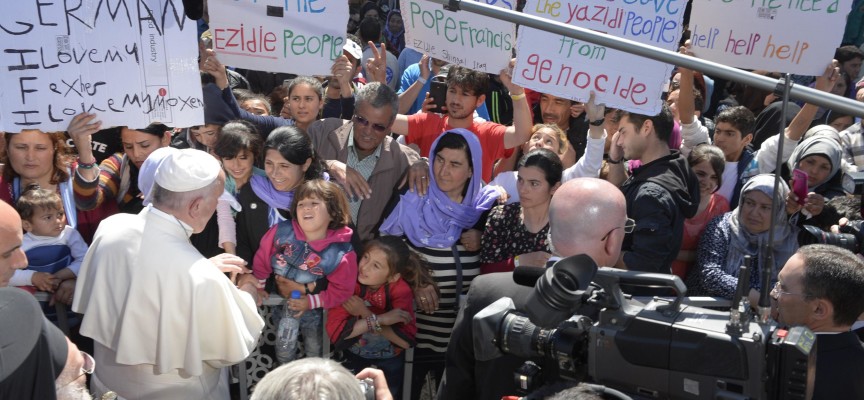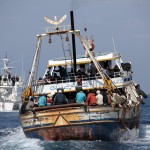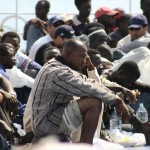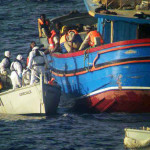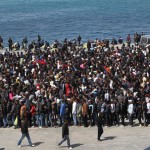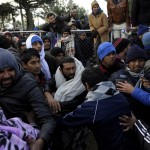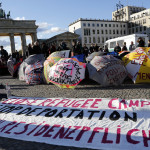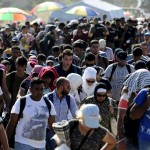The humanitarian flash journey of the Pope to the island of Lesbos in Greece has confirmed the Pope’s attention to the most vulnerable in our time and in various parts of the world, that is the migrants and asylum seekers. Meanwhile, in the Mediterranean, on the anniversary of the 800 migrants died last year in the Channel of Sicily, there are probably another 400 deaths.
“Pope Francis continues, as no other does, to keep the attention focused on the epic of migrants and asylum seekers throughout the world,” says Father Alessandro Gazzola, superior general of the Missionaries of St. Charles (Scalabrinians), currently on a visit to missions in Canada, USA, Mexico and Guatemala, the latter particularly marked by massive and daily flows of migrants.
“The recent visit to the refugee camp of Lesbos, in Greece, stresses p. Gazzola, is just the latest prophetic act, in terms of time, that the Pope carries out since the day of his election: let’s just remember his commemoration of the dead migrants on the island of Lampedusa, the risky, at times, journey to Central Africa, or the continuous effort because the powerful of the earth do not talk down and forget the tide of people who every day try to pass from Mexico to the US, described by Francis as a real ‘human tragedy’”.
“The sign of Francis, his concrete presence in many of the symbolic places of injustice and violence, the ecumenical involvement of all Christians, is better than too many words spent by those who would in theory have the power to implement concrete plans of peace, advocacy and justice, especially for younger migrants”, adds p. Gazzola.
“The Pope once again draws us all to the essence of our being human and Christian”, concludes the superior general. “He gives voice to those who will never have the opportunity to be heard, to those who suffer threats to their faith and must leave everything. He is doing his part in disassembling the indifference and outrageous games of the so-called leaders, in theory employed in ‘public affairs’, but in fact well linked to established practices and comfortable arrangements that do not allow to reach conclusive decisions on any topic. We need to get together, with courage, and process immediately reception and integration policies, making it possible to arrive at a mutual acceptance of differences”.
The Scalabrini Missionaries, working in the field and in a network with other church and non church realities on the issue of migration, reaffirm urgently:
– the creation of humanitarian “ordinary” corridors, from countries at war together with a peace action in the countries of departure for a return to democracy;
– the immediate implementation of the redistribution plan of asylum seekers among all countries of the European Union;
– the development of long-term migration policies that stand as guarantors for those who accept and those who are welcomed;
– special attention to the thousands of migrant children, often unaccompanied, who are easy victims of the traffic of human beings or of whom traces have already been lost.
Missionaries of St. Charles – Scalabrinians (www.scalabrini.org)
Il viaggio-lampo umanitario del Pontefice all’isola di Lesbo, in Grecia, ha confermato l’attenzione del Papa per i più fragili nel nostro tempo e in varie parti del mondo, ossia i migranti e i richiedenti asilo. Intanto nel Mediterraneo, nell’anniversario degli 800 migranti morti l’anno scorso nel Canale di Sicilia, si contano probabilmente altri 400 morti.
“Papa Francesco continua, come nessun altro, a tenere alta l’attenzione sull’epopea dei migranti e dei richiedenti asilo nel mondo intero”, afferma p. Alessandro Gazzola, superiore generale dei Missionari di S. Carlo (Scalabriniani), attualmente in visita alle missioni di Canada, Usa, Messico e Guatemala, quest’ultime realtà particolarmente segnate da ingenti e quotidiani flussi di migranti.
“Il recente viaggio al campo profughi di Lesbo, in Grecia – sottolinea p. Gazzola – è solo l’ultimo gesto profetico, in termini di tempo, che il Pontefice porta avanti dal giorno della sua elezione: ricordo la commemorazione dei morti dell’isola di Lampedusa, il rischioso, a tratti, viaggio in Centro Africa, oppure il continuo sforzo perché i potenti della terra non dimentichino nel silenzio la marea di persone che ogni giorno tentano il passaggio tra Messico e Usa, definita da Francesco una vera ‘tragedia umana’”.
“Il segno di Francesco, la sua presenza concreta in molti dei luoghi-simbolo dell’ingiustizia e della violenza, il coinvolgimento ecumenico di tutti i cristiani, vale più delle troppe parole spese da chi avrebbe in teoria il potere di attuare piani concreti di pace, di difesa dei diritti e di giustizia, soprattutto in favore dei minori migranti”, aggiunge p. Gazzola.
“Il Pontefice richiama ancora una volta tutti noi all’essenza del nostro essere umani e cristiani”, conclude il superiore generale. “Egli si sta facendo voce di chi non avrà mai la possibilità di essere ascoltato, di chi subisce minacce per la propria fede e deve lasciare tutto. Egli sta facendo la sua parte nello smontare l’indifferenza e i giochi scandalosi dei cosiddetti leader, sulla carta occupati nella ‘cosa pubblica’, ma nei fatti ben legati a prassi consolidate e accordi di comodo che non permettono di arrivare a decisioni risolutive su alcun argomento. Occorre mettersi insieme, con coraggio, ed elaborare subito politiche di accoglienza e integrazione che permettano di giungere a una convivialità delle differenze”.
I Missionari Scalabriniani, impegnati sul campo e nel fare rete con altre realtà ecclesiali e non sul tema migratorio, ribadiscono con urgenza:
– la creazione di corridoi umanitari “ordinari” dai Paesi in guerra assieme a un’azione di pacificazione nei Paesi di partenza per un ritorno alla democrazia;
– la messa in atto immediata del piano di redistribuzione dei richiedenti asilo tra tutti i Paesi dell’Unione Europea;
– l’elaborazione di politiche migratorie durature che si facciano garanti verso chi accoglie e chi viene accolto;
– una particolare attenzione alle migliaia di minori che migrano, spesso non accompagnati, e che sono facili vittime del traffico di esseri umani o dei quali si sono già perse le tracce.
Missionari di San Carlo – Scalabriniani (www.scalabrini.org)
Latest posts by EURCOM (see all)
- What are the aims of the European security and defence policy? - 12 aprile 2017
- The Church is for the European project - 28 marzo 2017
- A message for Europe - 28 marzo 2017

